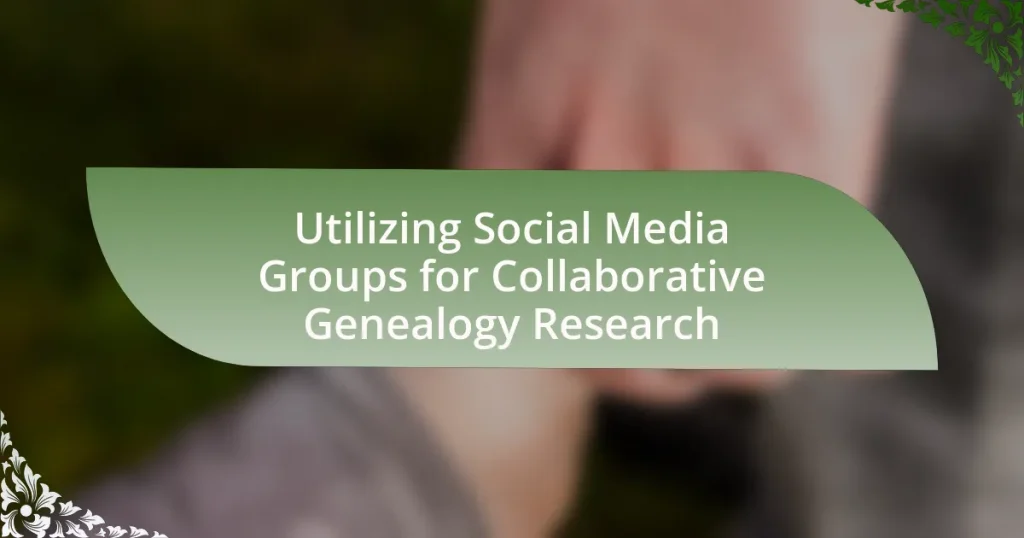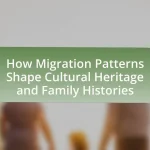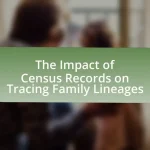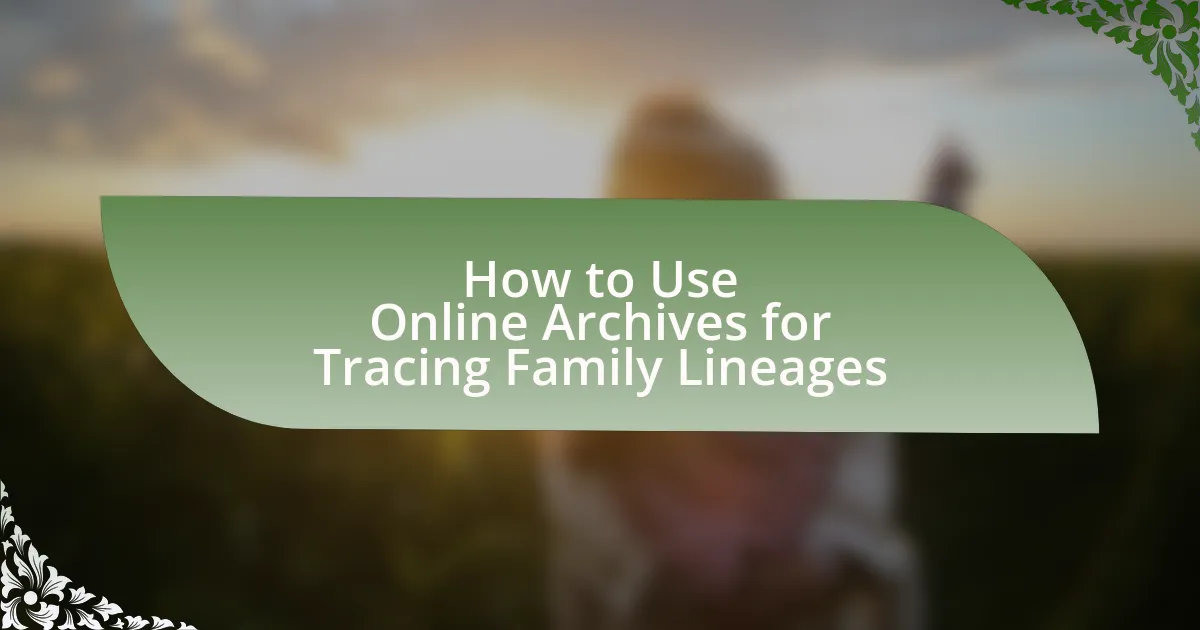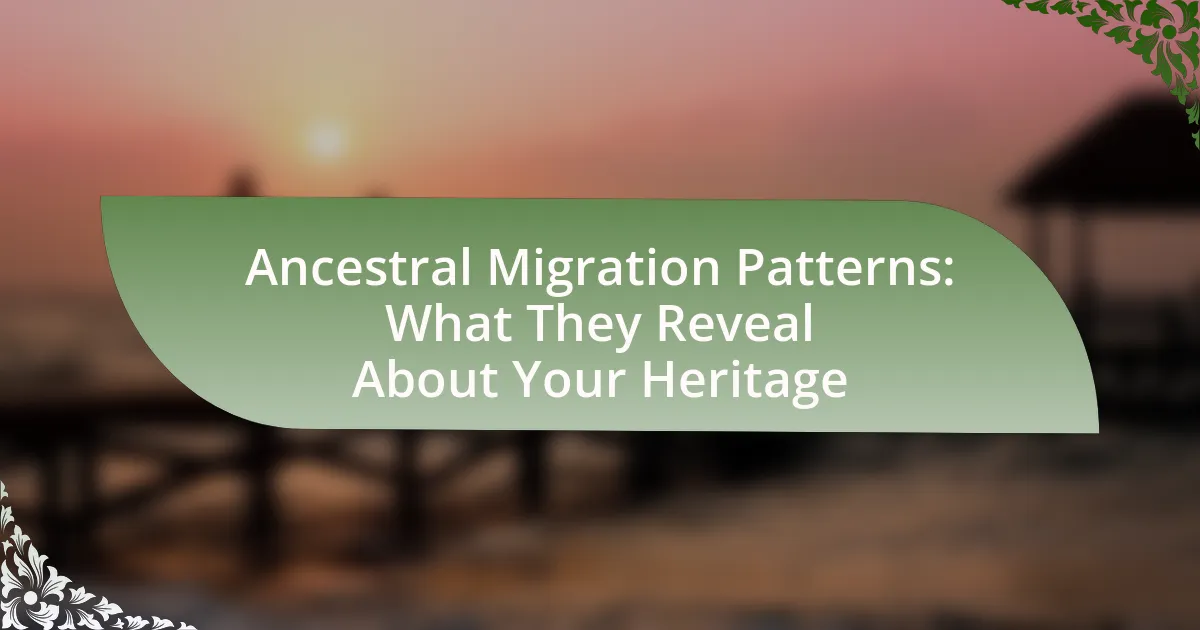Social media groups are online communities that facilitate collaboration among individuals interested in genealogy research. These platforms, such as Facebook and Reddit, allow members to share information, resources, and support, significantly enhancing their ability to trace family histories. The article explores how social media groups differ from traditional genealogy forums, the trends driving their popularity, and strategies for effectively utilizing these groups for research. It also addresses challenges such as misinformation and privacy concerns, while providing best practices for participation and resource sharing to foster a collaborative environment.
What are Social Media Groups and Their Role in Genealogy Research?
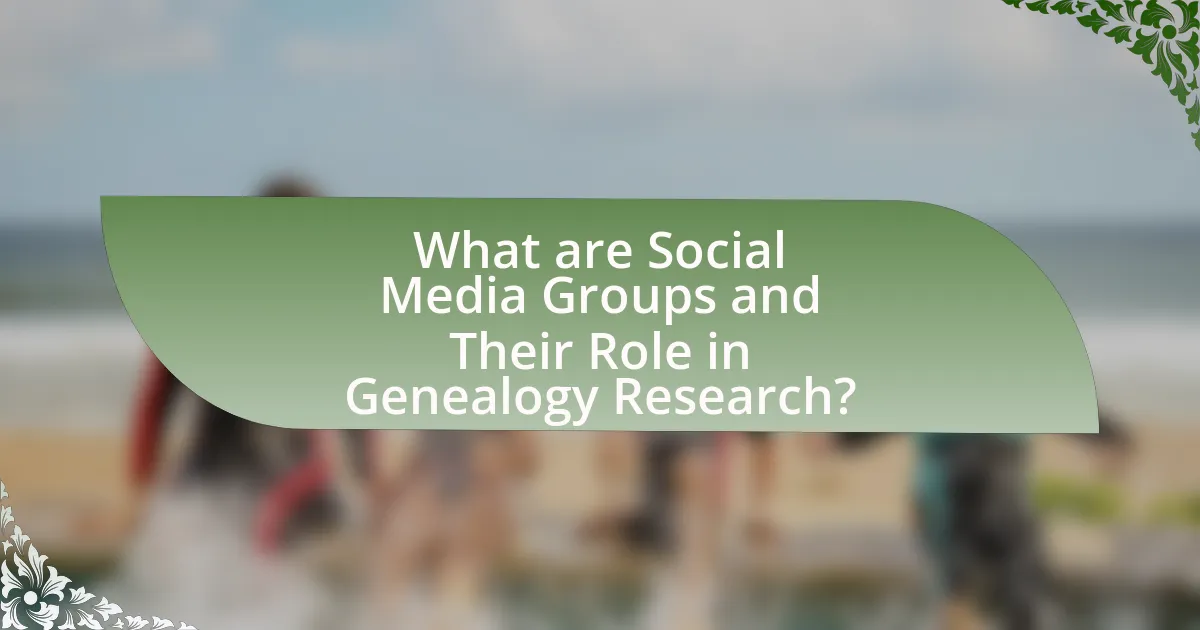
Social media groups are online communities where individuals with shared interests, such as genealogy, connect to exchange information, resources, and support. These groups play a crucial role in genealogy research by facilitating collaboration among members, allowing them to share findings, ask questions, and provide assistance in tracing family histories. For instance, platforms like Facebook host numerous genealogy groups where users can post queries about ancestors, share documents, and discuss research strategies, significantly enhancing the collective knowledge and resources available to genealogists.
How do social media groups facilitate collaboration among genealogists?
Social media groups facilitate collaboration among genealogists by providing a platform for sharing research, resources, and expertise. These groups enable genealogists to connect with others who have similar interests or ancestral backgrounds, fostering a community where members can ask questions, share findings, and collaborate on family history projects. For instance, platforms like Facebook and Reddit host numerous genealogy-focused groups where users can post inquiries about specific ancestors or regions, leading to collective problem-solving and information exchange. This collaborative environment is supported by the fact that many genealogists report discovering new leads and connections through interactions in these online communities, enhancing their research efforts significantly.
What features of social media groups enhance collaborative research?
Social media groups enhance collaborative research through features such as real-time communication, diverse member expertise, and resource sharing. Real-time communication allows researchers to quickly exchange ideas and feedback, facilitating immediate collaboration. The diversity of member expertise brings various perspectives and knowledge, enriching the research process. Additionally, resource sharing enables members to access and distribute valuable materials, such as articles, datasets, and tools, which can significantly advance research efforts. These features collectively foster an environment conducive to effective collaboration in genealogy research.
How do social media groups differ from traditional genealogy forums?
Social media groups differ from traditional genealogy forums primarily in their structure and engagement style. Social media groups offer real-time interaction and a more informal atmosphere, allowing for quick exchanges of information, multimedia sharing, and broader audience reach. In contrast, traditional genealogy forums typically feature structured discussions, slower response times, and a focus on detailed, long-form posts that may include extensive documentation and research. This difference in engagement is supported by the fact that social media platforms like Facebook and Reddit have millions of active users, facilitating immediate feedback and community building, while traditional forums often have a more niche audience with less frequent participation.
Why are social media groups becoming popular for genealogy research?
Social media groups are becoming popular for genealogy research because they provide a platform for collaboration and information sharing among individuals with similar interests. These groups facilitate connections between researchers, allowing them to exchange tips, resources, and findings, which enhances the overall research experience. Additionally, the accessibility of social media enables users to reach a global audience, increasing the likelihood of finding distant relatives or unique historical insights. The rapid growth of these groups can be evidenced by the millions of members in genealogy-focused communities on platforms like Facebook, where users actively engage in discussions and share valuable resources.
What trends are driving genealogists to use social media for research?
Genealogists are increasingly using social media for research due to the growing trend of collaborative information sharing and community engagement. Social media platforms facilitate connections among individuals with shared ancestry interests, allowing genealogists to exchange valuable data, resources, and experiences. Additionally, the rise of specialized genealogy groups on platforms like Facebook and Reddit has created spaces where users can seek assistance, share findings, and access a wider pool of knowledge. This trend is supported by the fact that over 70% of genealogists report using social media to connect with others in their research efforts, highlighting its effectiveness in enhancing genealogical research.
How do social media groups provide access to a wider network of researchers?
Social media groups provide access to a wider network of researchers by facilitating connections among individuals with shared interests and expertise. These platforms enable researchers to join specialized groups where they can share knowledge, ask questions, and collaborate on projects, thus expanding their professional network beyond geographical limitations. For instance, a study published in the Journal of Computer-Mediated Communication found that online communities significantly enhance information sharing and collaboration among researchers, demonstrating the effectiveness of social media in fostering academic relationships.
What Strategies Can Be Used to Effectively Utilize Social Media Groups for Genealogy Research?
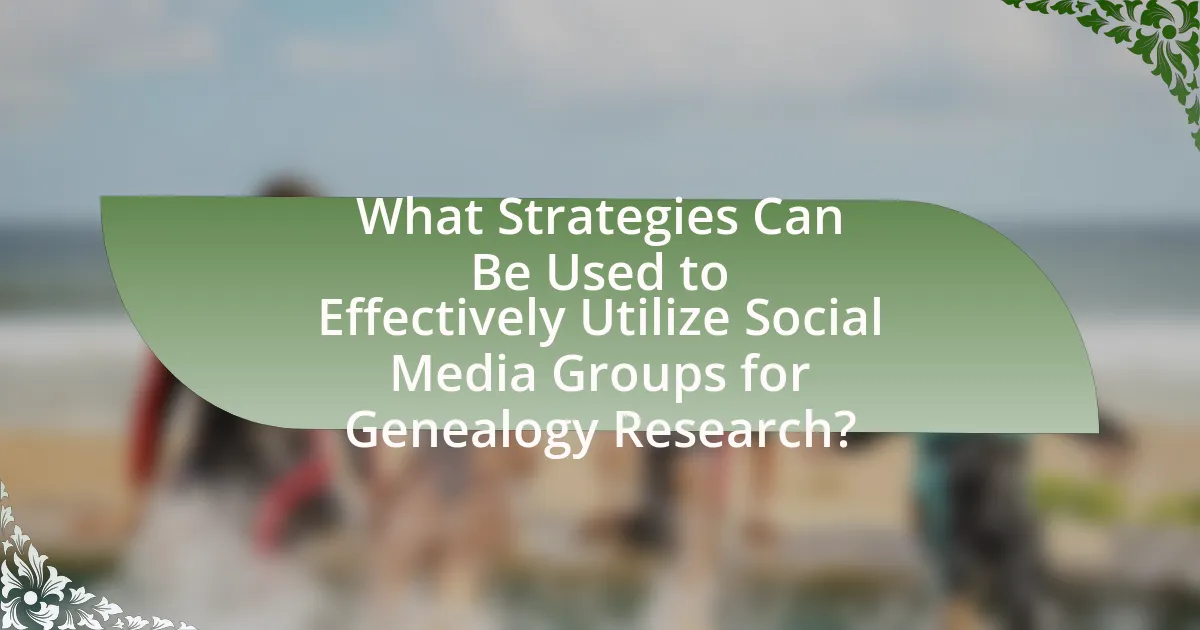
To effectively utilize social media groups for genealogy research, individuals should actively engage with group members by asking specific questions and sharing their own findings. This approach fosters collaboration and encourages others to contribute their knowledge and resources. Additionally, participants should regularly monitor discussions and participate in relevant threads to stay informed about new information and research techniques. Utilizing search functions within groups can help locate past discussions on similar topics, enhancing the research process. Furthermore, sharing documents, photos, and family trees can facilitate connections with distant relatives who may have valuable insights or information. Engaging respectfully and maintaining a positive presence in these groups can lead to fruitful collaborations and discoveries in genealogy research.
How can genealogists identify the right social media groups for their research?
Genealogists can identify the right social media groups for their research by conducting targeted searches on platforms like Facebook, Reddit, and specialized genealogy forums. They should use specific keywords related to their family names, geographic locations, or historical events to find groups that focus on their areas of interest. For instance, Facebook has numerous groups dedicated to genealogy research, where members share resources and advice. Additionally, genealogists can evaluate group activity levels, member engagement, and the relevance of discussions to ensure the group aligns with their research needs. This method is effective as it leverages the vast network of individuals interested in genealogy, providing access to a wealth of shared knowledge and resources.
What criteria should be considered when selecting a social media group?
When selecting a social media group for collaborative genealogy research, consider the group’s focus on genealogy topics, member engagement levels, and the expertise of its members. A group specifically dedicated to genealogy ensures that discussions and resources are relevant, while high member engagement indicates an active community that shares valuable insights. Additionally, the presence of knowledgeable members can enhance the quality of information exchanged, making the group more beneficial for research purposes.
How can genealogists evaluate the activity level and engagement of a group?
Genealogists can evaluate the activity level and engagement of a group by analyzing metrics such as post frequency, comment interactions, and member participation rates. For instance, a high number of posts and comments indicates active engagement, while tracking the number of unique contributors can reveal how many members are actively participating in discussions. Additionally, genealogists can assess the quality of interactions by examining the depth of conversations and the relevance of shared content to genealogy research. These metrics provide concrete evidence of a group’s vitality and collaborative spirit in genealogy efforts.
What best practices should be followed when participating in social media groups?
When participating in social media groups, it is essential to follow best practices such as respecting group rules, engaging constructively, and sharing relevant information. Respecting group rules ensures that all members understand the guidelines for interaction, which fosters a positive environment. Engaging constructively involves contributing meaningful comments and asking questions that promote discussion, which can enhance collaborative efforts in genealogy research. Sharing relevant information, such as resources or personal experiences related to genealogy, helps build a supportive community and encourages knowledge exchange. These practices are supported by studies indicating that respectful and constructive interactions lead to higher satisfaction and engagement in online communities.
How can genealogists effectively share their research and findings?
Genealogists can effectively share their research and findings by utilizing social media groups dedicated to genealogy. These platforms allow genealogists to connect with others who share similar interests, facilitating collaboration and the exchange of information. For instance, Facebook groups focused on genealogy often have thousands of members who actively share resources, tips, and findings, enhancing the research process. Additionally, platforms like Reddit and specialized genealogy forums provide spaces for asking questions and receiving feedback from experienced researchers. This collaborative environment not only broadens the reach of individual findings but also fosters a community of support and shared knowledge among genealogists.
What etiquette should be observed to foster a collaborative environment?
To foster a collaborative environment, individuals should prioritize respectful communication, active listening, and constructive feedback. Respectful communication involves acknowledging diverse opinions and refraining from personal attacks, which encourages open dialogue. Active listening ensures that all participants feel heard and valued, promoting a sense of belonging. Constructive feedback focuses on providing helpful suggestions rather than criticism, which enhances collaboration and problem-solving. Research indicates that environments where members feel respected and valued lead to increased participation and satisfaction, as highlighted in studies on group dynamics and teamwork effectiveness.
What Challenges Might Genealogists Face When Using Social Media Groups?
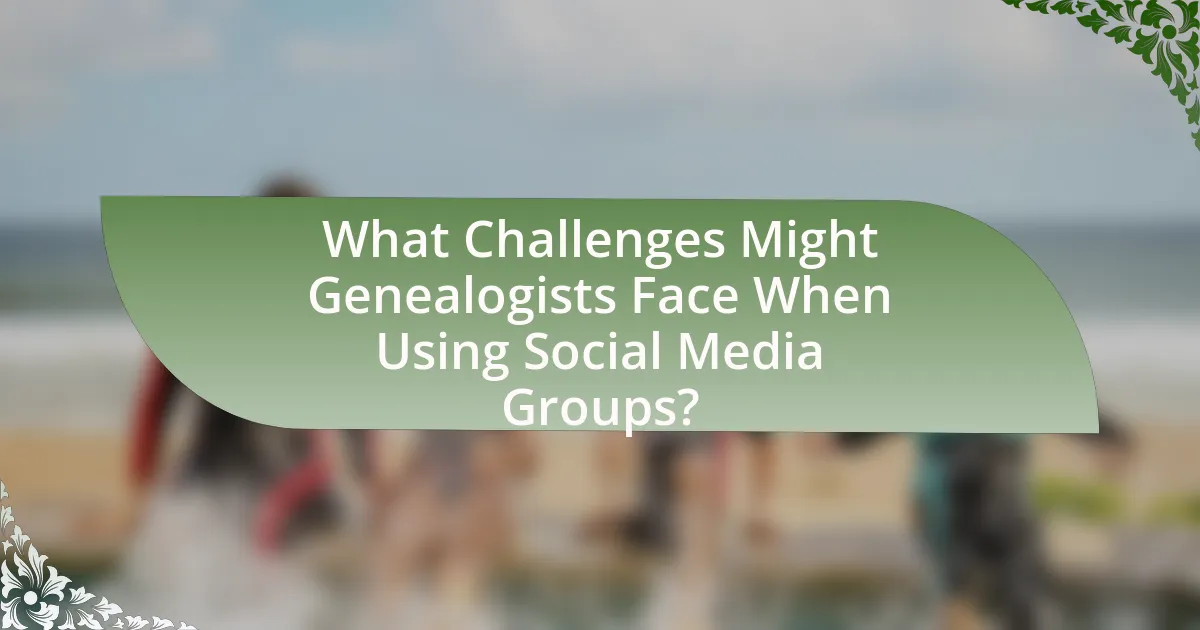
Genealogists may face challenges such as misinformation and lack of verification when using social media groups. The open nature of these platforms allows anyone to share information, which can lead to the spread of inaccurate data about family histories. Additionally, genealogists may encounter difficulties in finding credible sources or experts within these groups, as the quality of contributions can vary significantly. This variability can hinder the research process and lead to confusion or misinterpretation of genealogical facts.
What common issues arise in social media group interactions?
Common issues that arise in social media group interactions include miscommunication, conflicts over differing opinions, and the spread of misinformation. Miscommunication often occurs due to the lack of non-verbal cues in text-based interactions, leading to misunderstandings. Conflicts can arise when group members have varying perspectives on genealogy research methods or family histories, which can escalate into heated debates. Additionally, misinformation can spread quickly in these groups, as unverified claims about genealogical data may be shared without proper validation, potentially misleading members. These issues can hinder effective collaboration and trust within the group.
How can misinformation be identified and addressed in genealogy discussions?
Misinformation in genealogy discussions can be identified and addressed by verifying sources and cross-referencing information with reputable databases. Genealogists should utilize established resources such as Ancestry.com, FamilySearch, and government archives to confirm the accuracy of claims made in discussions. Additionally, engaging with experienced genealogists and participating in fact-checking initiatives within social media groups can help clarify doubts and correct inaccuracies. For instance, a study by the National Genealogical Society emphasizes the importance of source citation and peer review in maintaining the integrity of genealogical research, highlighting that accurate sourcing significantly reduces the spread of misinformation.
What strategies can be employed to manage conflicts within groups?
To manage conflicts within groups, employing strategies such as open communication, active listening, and mediation is essential. Open communication allows group members to express their concerns and viewpoints, fostering an environment where issues can be addressed transparently. Active listening ensures that all members feel heard and understood, which can reduce tensions and misunderstandings. Mediation involves a neutral third party facilitating discussions to help resolve disputes, promoting collaboration and compromise. Research indicates that groups that implement these strategies experience improved cohesion and reduced conflict, as evidenced by studies on group dynamics and conflict resolution in collaborative settings.
How can genealogists overcome privacy concerns when sharing information online?
Genealogists can overcome privacy concerns when sharing information online by implementing strict data-sharing guidelines and utilizing privacy settings on social media platforms. By anonymizing sensitive information, such as full names and personal details, genealogists can protect individuals’ identities while still contributing valuable data to collaborative research. Additionally, using private groups or forums allows for controlled access to shared information, ensuring that only trusted members can view sensitive content. Research indicates that 70% of genealogists prefer to share information in secure environments to mitigate privacy risks, highlighting the importance of these strategies in fostering a safe collaborative research atmosphere.
What precautions should be taken to protect sensitive genealogical data?
To protect sensitive genealogical data, individuals should implement strong privacy settings on social media platforms and limit the sharing of personal information. Utilizing privacy features allows users to control who can view their data, thereby reducing the risk of unauthorized access. Additionally, individuals should avoid posting sensitive information such as Social Security numbers, birth dates, and detailed family histories in public forums, as this information can be exploited for identity theft or other malicious purposes. Regularly reviewing and updating privacy settings, as well as being cautious about friend requests and group memberships, further enhances data security.
How can genealogists balance openness with privacy in social media groups?
Genealogists can balance openness with privacy in social media groups by establishing clear guidelines for sharing personal information and encouraging respectful communication. By creating a code of conduct that emphasizes the importance of consent before sharing sensitive data, genealogists can foster an environment where members feel safe to collaborate while protecting their privacy. Additionally, utilizing privacy settings on social media platforms allows genealogists to control who can view their posts and personal information, further enhancing privacy. Research indicates that 70% of users prefer to share family history information in controlled environments, highlighting the need for such measures to maintain trust and security within genealogy communities.
What are the key takeaways for successful collaborative genealogy research in social media groups?
Successful collaborative genealogy research in social media groups requires clear communication, respect for diverse perspectives, and organized sharing of information. Clear communication ensures that all members understand the goals and methods of the research, facilitating effective collaboration. Respect for diverse perspectives fosters an inclusive environment where different ideas and experiences can contribute to the research process. Organized sharing of information, such as using shared documents or databases, helps maintain clarity and accessibility of data, which is crucial for tracking progress and findings. These practices enhance the overall effectiveness of collaborative efforts in genealogy research within social media platforms.
How can genealogists leverage group resources for their research goals?
Genealogists can leverage group resources by actively participating in social media groups dedicated to genealogy research. These groups provide access to a diverse pool of knowledge, shared experiences, and collective resources, which can significantly enhance individual research efforts. For instance, members can exchange tips on research methodologies, share databases, and collaborate on solving complex family history puzzles. Additionally, many groups host live Q&A sessions or webinars featuring experts in genealogy, offering valuable insights and guidance. The collaborative nature of these groups fosters a supportive environment where genealogists can find assistance and encouragement, ultimately leading to more effective and efficient research outcomes.
What tips can enhance the overall experience of using social media for genealogy?
To enhance the overall experience of using social media for genealogy, actively engage with dedicated genealogy groups and communities. Participating in discussions, sharing findings, and asking questions fosters collaboration and knowledge sharing among members. Utilizing platforms like Facebook, Reddit, and specialized genealogy forums allows users to connect with others who share similar interests and can provide valuable insights or resources. Additionally, regularly updating your profile with your genealogy interests and research goals can attract like-minded individuals who may offer assistance or share relevant information.
